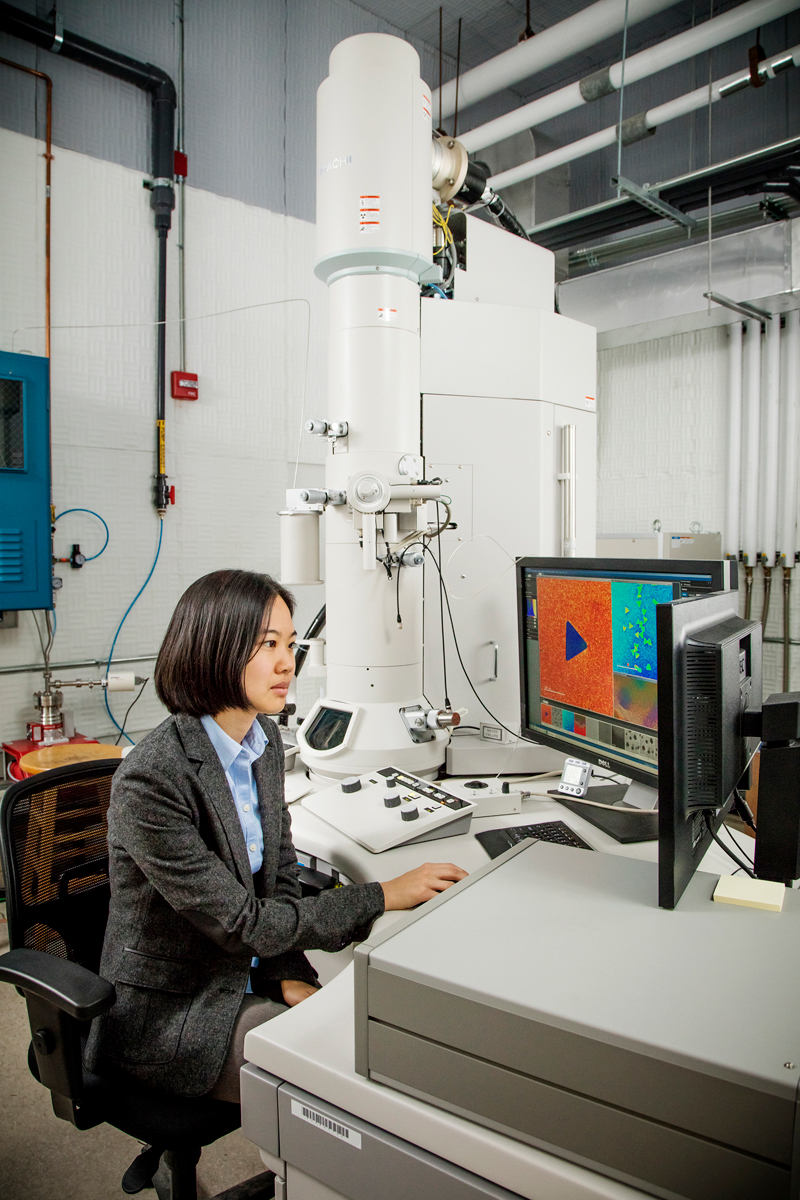Materials Science & Engineering
Materials Science and Engineering provides an understanding of the underlying principles of synthesis and processing of materials and of the interrelationships between structure, properties, and processing. Students learn how to create advanced materials and systems required, e.g., for flexible electronic displays and photonics that will change communications technologies, for site specific drug delivery, for self-healing materials, for enabling the transition to a hydrogen-based economy, and for more efficient photovoltaics and nuclear systems for energy production. The curriculum uses concepts from both basic physics and chemistry and provides a detailed knowledge of what makes the materials we use every day behave as they do.
The MatSE program provides a diverse set of courses enabling a plan of study designed around the interest of the student. Highlights of the possible focus areas are:
The science and engineering of materials for use in biological applications, particularly as related to human health. This area includes concepts in basic and intermediate chemistry and basic and intermediate biology, with relatively less coverage of physics topics. It includes a subset of the standard junior year courses and requires additional chemistry and biology in the junior year
Studies the science and engineering of ceramic materials, including alloy design, composites, synthesis, and processing methods. Ceramics makes significant use of concepts from both basic physics and basic chemistry.
Describes the design and engineering of materials primarily for the microelectronics industries. Topics span the ceramics, metals, and polymers areas. Concepts from basic and intermediate physics are used along with basic chemistry.
Introduces the design and processing of metals and alloys to achieve desired properties. This area primarily uses concepts from basic and intermediate physics with relatively less emphasis on chemical concepts.
Teaches the methods for molecular design to achieve desired properties in individual polymers, polymer blends, and polymer composites as well as processing methods. This area primarily uses concepts from basic and intermediate chemistry with relatively less emphasis on physics concepts.
Introduces principles for designing and engineering materials structure, properties, and chemistry from atomic to macroscopic scales, this area also teaches fundamental and practical concepts necessary for determining materials structure and chemistry at different length scales. This area utilizes basic knowledge from physics and chemistry.
Studies the science and engineering of materials formed by combining multiple materials into a single material. Studies of composites make significant use of properties of materials and mathematical knowledge.
Studies materials for energy production, harvesting, and storage; materials for environmental remediation, water purification, and recycling; and includes discussions on sustainability and life-cycle analysis of the environmental impact of materials. Materials issues related to both renewable and non-renewable energy production are covered. This area utilizes concepts from both physics and chemistry.
Introduces computational modeling approaches for materials that span length- and time-scales from the atomic to the macroscopic. This area focuses on computational prediction of material response to different stimuli (mechanical loads, temperature, electronic excitations, etc.) and fundamental material properties.
- MSE 201—Phases & Phase Relations
- MATH 221—Calculus I
- MATH 231—Calculus II
- PHYS 211—University Physics: Mechanics
- PHYS 212—University Physics: Electricity & Magnetism
Students should consult with an academic advisor regarding course selection prior to the advanced registration period.
Graduates with MatSE degrees find jobs in aerospace, automotive, biomedical, chemical, electronics, energy, nanotechnology, computational modeling, consulting, patent law and telecommunications industries—virtually any industry that uses “stuff.”
- Communicate effectively
- Design and conduct experiments
- Identify materials-related problems and formulate plans to solve such problems
- Knowledge of mathematics, science, and engineering, including calculus, thermodynamics, transport phenomena, solid state physics and mechanics
- Understanding of contemporary and cultural issues
- Understanding of the impact of materials engineering on society and the environment
- Understanding of the professional and ethical responsibilities of materials engineers
- Consultant
- Manufacturing Engineer
- Material Engineer
- Materials Consultant
- Metallurgical Engineer
- Process Engineer
- Research and Development
Some careers may require education beyond an undergraduate degree.
- Participating in undergraduate research
- Applying for a study abroad experience
- Utilizing resources of The Career Center and Engineering Career Services
- Joining a Registered Student Organization (RSO) related to this major, such as:
- Material Advantage: plans social and professional events/speakers and serves as main resource for undergraduate Materials Science and Engineering majors.
- Keramos: offers honor society activities for Materials Science and Engineering students.
There are several professional organizations dedicated to Materials Science and Engineering. Their websites might be able to provide a glimpse in the world of Materials Science and Engineering. These organizations include ASM International, The Minerals, Metals & Materials Society, and Society of Plastics Engineers.


